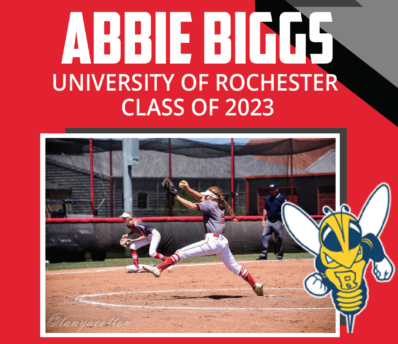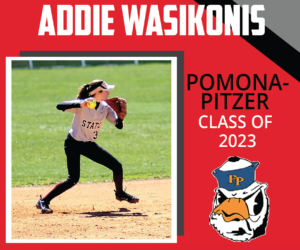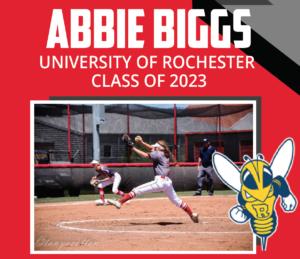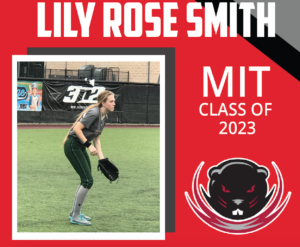



March 29, 2019
At Headfirst Honor Roll Camps, we are always thrilled to hear from our alumni about their success stories in the recruiting process – and to share their journeys with other student-athletes still searching for the right fit at the next level. Below, we highlight three of our alumni who leveraged their hard work on the field and in the classroom to continue their softball careers at high-academic schools as they share their experiences in the high-academic recruiting process, advice for student-athletes pursuing a similar goal and how Headfirst helped them along the way:
 MIF/OF Addie Wasikonis – Pomona-Pitzer, class of 2023
MIF/OF Addie Wasikonis – Pomona-Pitzer, class of 2023National Honors Society; Environmental Club President; Nan Sichler Softball Award Winner; District 6 PIAA All-Star; Mid Penn Commonwealth League All-Star
What do you know now about the high-academic recruiting process that you wish you knew when you were going through the recruiting process?
It’s up to you to get where you need to be. Be proactive to put in the work and dedicate yourself to that goal. It takes longer to finalize an academic commitment, so be patient*. Communication is key – even if you don’t hear back from colleges right away, they are paying attention, and you should keep in touch. If you don’t think it’s possible to connect with a certain school, just give it a try. I reached out to the Pomona-Pitzer coach in the spring of my junior year because I remembered the school from Headfirst. When I researched schools, I found that Pitzer has a great environmental analysis program, which is what I want to study**. I wasn’t sure it would be possible for a player from Pennsylvania to be considered for their team, but Coach Ferguson gave me an opportunity.
What impact did Headfirst Honor Roll Camps have on your recruiting process? What lessons did you learn that helped you later on in your recruiting process?
I learned that someone is always watching. Even if you don’t know it, the coaches at Headfirst can keep tabs on you to look for improvement over time. If you can stand out, they will remember you when you express interest in their school***. Also, even if you are nervous about talking to coaches, camp is the time to do it. It is the perfect opportunity and situation to do so. I was really nervous, but I made sure I took advantage of it because I realized that’s a huge part of why coaches go to Headfirst. Other than going to a camp at the college, it is really one of the few times you can talk to a coach in person. Getting time on the field with them also gives you a chance to get to know them. The relationship should go both ways. I built confidence at camp and was also able to open my mind to schools I hadn’t even heard of before.
How did your recruiting process compare to your high school or travel ball teammates who were not pursuing a high-academic school?
It was hard sometimes when some of my travel ball teammates committed to schools. It felt like maybe I was a little behind, even though I was considering and being recruited at a number of schools. When I was officially offered admission to Pitzer, and could announce my commitment, it felt even sweeter – and finding that right overall fit at a great academic school was certainly worth the wait.
What is the best piece(s) of advice that you would give current high school student-athletes looking to play at a high-academic school?
Be open minded to exploring all the schools out there and visit whenever you can. When you attend Headfirst, you will hear of schools you may not even know. Research them and see if they have programs or majors that interest you. Start to narrow down the qualities you are looking for in a college and rank the aspects that are important to you. I knew I was looking for certain things in a school, and it made it a lot easier when I started getting serious about making a decision. Also, communicate! Always stay in touch with the schools you are considering. If a coach emails you, always respond, even if it’s not a school you are interested in. If you don’t get a response back, stay in touch and find reasons to reach out to the coaches. Coach Ferguson said I did a good job of staying in touch so I was glad that was noticed. Finally, the dream school you have right now may not work out, but you can find another dream school and eventually attend the school that is just right for you. Let the process lead you to it.
[*] For high-academic student-athletes pursuing the types of schools that come to Honor Roll, the recruiting process tends to move a bit more deliberately, due to the academic rigor of the admissions process. We’ve posted about this timeline and how it can serve you as a student-athlete on our blog before – check out our piece on the high-academic recruiting roadmap.
[**] It’s crucial to do your research, and to keep an open mind about the coaches that you meet throughout your recruiting process. For more tips on how to think about and find your “holistic fit”, check out our previous piece: “All Things Considered: Finding the Right Fit”
[***] College coaches really do have a great memory – but it’s also Headfirst’s job to help them. Before, during and after camp, coaches receive all your information – contact, academic, objective measurements from camp – both in hard copy and digitally so that they have that for reference when student-athletes reach out. Also, they have access to all your filmed action from camp, too!

National Honors Society; Academic All-District 2017 and 2018 (2019 pending); All-District Team 2017 & 2018 (2019 pending); District Champions 2018 (First District Championship in 12 years and first in 6A – the largest division in Texas; Bi-District Champions 2017 & 2018
What do you know now about the high-academic recruiting process that you wish you knew when you were going through the recruiting process?
I wish I hadn’t spent so much time on schools that didn’t make sense academically. When I first started my recruiting process, I knew I wanted to be involved in the medical field, but not sure how specifically. By the time I decided on nursing, we had spent a lot of time looking at schools that didn’t have nursing programs. At that point, I was looking at schools where I would go for an undergraduate degree but wouldn’t be able to stay for my nursing degree. The moment I stepped foot on the University of Rochester’s campus, I had the feeling I belonged there.
What impact did Headfirst Honor Roll Camps have on your recruiting process? What lessons did you learn that helped you later on in your recruiting process?
Coming from Texas, it was really hard to get in front of the high-academic coaches and schools I was interested in. Headfirst gave me a great opportunity to get in front of those coaches and to start building relationships with them.
How did your recruiting process compare to your high school or travel ball teammates who were not pursuing a high-academic school?
Because we’re in Texas, pretty much all the coaches who would see us play with my travel team or in tournaments were from here. My parents and I really had to work to make sure I was playing in front of high-academic coaches. We made several trips to the Northeast and Midwest to do that. I also had to make the most out of the Colorado Sparkler because that was the one tournament where I knew I could be seen by the types of colleges that I was looking at.
What is the best piece(s) of advice that you would give current high school student-athletes looking to play at a high-academic school?
Academics come first. Take the SAT and ACT your sophomore year to get your scores and see where you need to improve, and then do what it takes to get in front of the coaches you want to play for in college. Because I was looking at high-academic schools, I had to have the ability to personalize my recruiting process and exposure. This led to some really tough decisions, but I knew that to accomplish my goals I had to get exposure to the right types of schools, which were different than those that many of my teammates are going to.

BASF Science Academy; nominated for Bryant Jordan scholarship; Gold Glove Award (2016); 2nd Team All-County for 7A (2017 and 2018)
What do you know now about the high-academic recruiting process that you wish you knew when you were going through the recruiting process?
That no one is there to judge me or put me down. Before most camps I was nervous and afraid I would not do well. I knew I was a good player, but I needed confidence. I wish I knew that it was okay to feel nervous, but there was no need to be stressed – and that everyone felt the same way! Coaches were there to help everyone get better, not ignore you if you had a bad day.
What impact did Headfirst Honor Roll Camps have on your recruiting process? What lessons did you learn that helped you later on in your recruiting process?
I have attended many softball camps, some with as low as 9 players and others with more than 200 players. At Headfirst I received the exposure I needed but in a setting that made me comfortable and did not place too much pressure on me. I learned to stay calm and not get too stressed over making a mistake because the same thing was happening to everyone else. The camp was a great way to make friends for the weekend and learn more about other girls chasing the same goal as me, since not everyone at my high school was looking at high-academic schools.
How did your recruiting process compare to your high school or travel ball teammates who were not pursuing a high-academic school?
I believe that my process was more stressful yet so much more rewarding. Because most of my teammates were looking at community colleges and D1 schools, they could know almost immediately if they’d have a confirmed a spot at the school. They did not have to really continue trying to improve grades or keep them at a high level; wherever they were at, they were good. I had to continue striving to have the best grades and academic success, not knowing for sure if I were going to be accepted into my top choices. However, I never stopped working hard and eventually was accepted into my number one school.
What is the best piece(s) of advice that you would give current high school student-athletes looking to play at a high-academic school?
Now finishing up my high school career, I am still unsure of how it will be once I start playing in college. But in order to be recruited, players really need to do their best to contact coaches and allow themselves to be seen (as well as keeping grades up, of course). I know that finances can be an issue for many families, but making a small YouTube channel and posting videos/highlights of yourself playing can help so much. Coaches love to watch your videos – and it’s a great way to keep coaches interested and in contact with you.